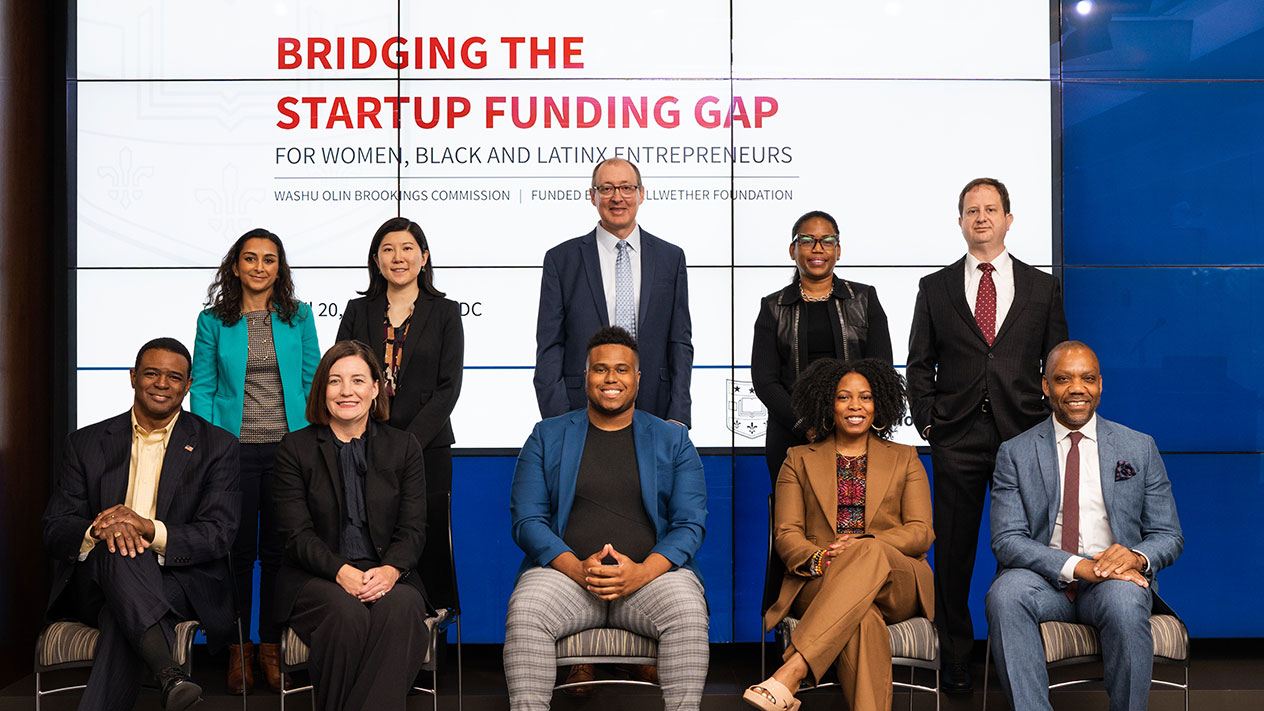2022–23 Commission

Bridging the Startup Funding Gap for Women, Black and Latinx Entrepreneurs
The commission offered recommendations for how policymakers and members of the industry could address the woeful gap in startup funding for women, Black and Latinx founders.
A stunning imbalance of startup funding available to founders who are women, Black or Latinx inspired the work of the 2022-23 Olin Brookings Commission. A new six-member commission—composed of entrepreneurs, venture capitalists and public policy experts—sought to examine the root causes of the inequity and develop solutions for the historically lopsided funding. Read more here about the commission’s process and work. Consider:
- Women represent 50.5% of the US population, yet recent reports suggest that only 2% of venture capital money went to female founders in 2021.
- Individuals identifying as Black or African American represent 13.6% of the US population, but Black founders received only about 1% of venture financing in 2020 and 1.4% in 2021.
- Individuals identifying as Hispanic or Latinx represent 18.9% of the US population. Yet data from Crunchbase, a database of startup funding, suggests that Hispanic or Latinx founders receive only about 2% of venture funding.
Recommendations to Balance Startup Funding
Commission members broke down their recommendations into three categories:
- Increased transparency: When trying to enact change, the first thing to do is track where you are today so you can tell whether the strategies are working. Among their suggestions, commission members recommended that data leaders like PitchBook and Crunchbase create options for expanded self-reporting in leading databases and provide a straightforward way for researchers and stakeholders to access and analyze data through a secure platform interface or data-sharing agreements.
- Government support: Venture capitalists’ singular goal is to make the largest possible return for investors. Therefore, the most promising solutions are those that incentivize venture capitalists to make diverse choices. For policymakers, that means creating a policy environment that doesn’t perpetuate the status quo but, rather, encourages an innovative community that is inclusive.
- Increase public awareness: In the aftermath of George Floyd’s murder and the social unrest that followed, many firms acknowledged there was work to be done to create more equitable funding. How are we holding each other accountable to those commitments? Commission members said an advocacy group is needed not only to hold each other accountable but also to amplify data findings and influence public policy.
The commission’s final report was titled "Briding the Startup Funding Gap for Women, Black and Latinx Entrepreneurs. Download the report.
See the presentation from the April 20, 2023, event at the Brookings Institution in Washington DC.
Second Commission Collaborators and Timeline
-
Founders and funders
- Lori Coulter, Co-Founder and CEO, Summersalt
- Morgan DeBaun, Founder and CEO, Blavity; Advisory Board Member, Black Economic Alliance
- Martin Hunt, CEO, Swanlaab USA Ventures
- Akeem Shannon, CEO and Founder, Flipstik
-
Policy influencers
- Charli Cooksey, Founder and CEO, WEPOWER
- Andre Perry, Senior Fellow, Brookings Institution
-
Research team and faculty conveners
- Doug Villhard, Professor of Practice in Entrepreneurship and Academic Director for Entrepreneurship, WashU Olin Business School
- Daniel Elfenbein, Professor of Organization and Strategy, WashU Olin Business School
- Dedric Carter, Forer Professor of Practice in Entrepreneurship, WashU Olin Business School; Former Vice Chancellor for Innovation and Chief Commercialization Officer, Washington University
- Gisele Marcus, Professor of Practice, WashU Olin Business School
- Ming zhu Wang, sixth-year Olin PhD student in strategy
- Aditi Vashist, fifth-year PhD student in organizational behavior
-
Academic Conference Committee
- Daniel Elfenbein, Washington University in St. Louis
- Sekou Bermiss, University of North Carolina at Chapel Hill
- Melissa Graebner, University of Illinois Urbana-Champaign
- Jorge Guzman, Columbia University
- Amanda Sharkey, Arizona State University
-
Project Timeline
- September 2022: The committee held a kickoff in St. Louis to level set and build a community knowledge base and shared understanding.
- November 2022: An academic conference at Brookings Institution, Washington, DC, allowed the committee to review data and interact with academics and policy experts.
- February 2023: In San Francisco, a working paper session was held to finalize recommendations and test recommendations on regional entrepreneurs.
- April 2023: The launch event took place at the Brookings Institution.